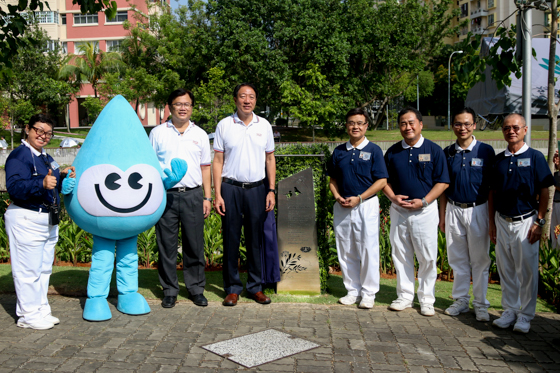 Tzu Chi x PaGamO Environmental Education E-sports World Cup was held online from 26th to 29th November 2021. 396 participants competed with one another from the comforts of their homes. (Photo by Teoh Chin Seong)
Tzu Chi x PaGamO Environmental Education E-sports World Cup was held online from 26th to 29th November 2021. 396 participants competed with one another from the comforts of their homes. (Photo by Teoh Chin Seong)
Not only can playing games provide entertainment, but one can also gain knowledge on environmental sustainability. The Tzu Chi x PaGamO Environmental Education E-sports World Cup was held from 26th to 29th November 2021. The 4-day competition was widely received, attracting 396 participants.
The top 30 scorers from Singapore will represent the nation at the global finals, competing with players from Taiwan, Singapore, Malaysia, Indonesia, the USA, and Canada. The finalists from Singapore will attend the global finals on 27th March 2022 at the Tzu Chi Humanistic Youth Centre.
This competition was co-organised by Tzu Chi Foundation (Taiwan) and BoniO Inc, which created the online educational gaming platform PaGamO, with assistance from Tzu Chi Foundation (Singapore). Awards for the competition were sponsored by ASUSTek Computer Inc.
A platform not only for gaming but also for learning environmental sustainability
Tzu Chi Environment Sustainability Department Manager Susan Tan hopes that players can have increased awareness of environmental sustainability through answering questions and clearing levels. Edutainment platforms like these are up and coming, allowing participants to gain beneficial knowledge whilst enjoying the joy from completing levels. In comparison, traditional methods such as spoon-feeding and cramming knowledge are no longer as effective, and creative education methods such as gaming platforms are the way to go.
She further elaborates that the main aim of the competition is not about winning but rather to instil a sense of passion and motivation in participants to lead more environmentally sustainable lifestyles.
Ms Tan acknowledged that this is Tzu Chi Environment Sustainability Department's first foray into promoting sustainability through a gaming competition. She elaborated that the volunteers seldom play such games, and she attributes the smooth-sailing event to the 41 marathon-like briefing sessions conducted by the volunteers. Some of the volunteers who did not have any prior gaming experience even took extra time to practise so that they can share and promote the game more easily. Eventually, a whopping 461 people signed up, placing Singapore in third place amongst all participating regions or countries in terms of registration numbers.
The PaGamO competition held this time was an open one, with no age limit. Ms Tan revealed that more than half of the participants were above the age of 26, with about 200 of them being above 41. Additionally, many of them had no prior gaming experience. Ms Tan is also happy that many older volunteers were open to participating in the competition, enjoying what is often perceived as popular among teenagers, and sharing a common experience.
This time, Tzu Chi also collaborated with three schools to promote the competition, namely United World College of South East Asia (UWCSEA), Nanyang Girls' High School, and Mee Toh School. Ms Tan shared that the schools were very keen on helping to promote the competition after they understood its aim, as they felt that students could benefit by being more environmentally conscious and broadening their horizons.
Ms Tan elaborated that the competition was not only about solving questions, but also tested players’ abilities in strategic planning. In the game, one can earn points and gain land territory upon correctly answering a question, while a wrong answer would cost them points and have their land seized away by others. Additionally, the game is designed such that players can use their points to purchase a plethora of tools to defend or decorate their land, thus catering to different players’ preferences.
The 500-question question bank consists of 9 themes, namely:
1. Water resource management
2. Prevention against natural disasters
3. Air pollution
4. Marine pollution
5. Circular economy
6. Recycling resources
7. Climate change
8. Reduction of carbon emissions
9. Food security
Question types included true/false questions and multiple-choice questions. Participants can choose to play the game in Chinese (Simplified) or English.
20-year-old Tzu Ching Gooi Ming Hong obtained the highest score in the preliminary round and advanced to the final round. He said that it is his first time taking part in such a competition, and he took time in the evenings or weekends to practise his skills, even amidst his National Service commitments.
 Singaporean Tzu Ching Gooi Ming Hong scored first place in the preliminary round and advanced to the finals. (Photo provided by Susan Tan)
Singaporean Tzu Ching Gooi Ming Hong scored first place in the preliminary round and advanced to the finals. (Photo provided by Susan Tan)
He also mentioned how the educational content of the game allowed him to learn fun facts regarding environmental sustainability and pique his interest in the circular economy. He realised how being environmentally sustainable can be economically viable as well.
As the saying goes, “Knowledge is power”. Ms Tan hopes that the game will allow participants to learn more about environmental sustainability and be rooted in their mind.
She further elaborated that the effort to raise awareness of environmental sustainability among youths through gaming will not end here, there are many more plans to utilise online gaming platforms to educate the youths about the environment.



